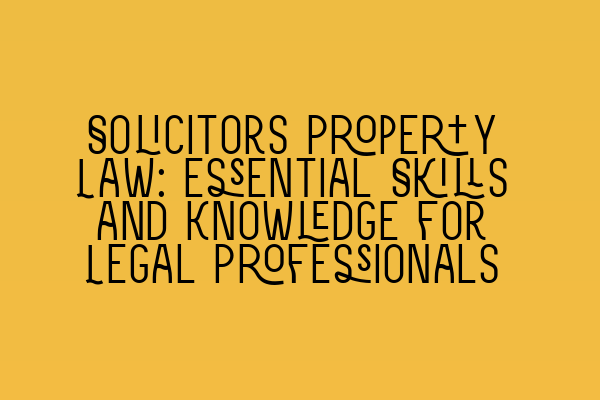Solicitors Property Law: Essential Skills and Knowledge for Legal Professionals
Property law is a complex and diverse area of legal practice that requires solicitors to have a deep understanding of both the legal principles and practical aspects involved. Whether you are planning to specialize in residential or commercial property law, it is essential to develop the necessary skills and knowledge to excel in this field. In this article, we will explore some of the key competencies required for solicitors practicing property law and provide some valuable resources to help you enhance your expertise.
1. Strong Analytical Skills
As a solicitor specializing in property law, you will often be faced with complex legal issues that require careful analysis and evaluation. It is crucial to have strong analytical skills to break down complex problems, identify relevant legal principles, and provide accurate and reliable advice to clients. Developing a systematic and logical approach to problem-solving will help you navigate the intricacies of property law effectively.
2. In-Depth Knowledge of Property Legislation
A solid understanding of property legislation is essential for any property law solicitor. You must be familiar with the relevant statutes, regulations, and case law that govern property transactions and disputes. Some of the key areas of legislation to focus on include land law, landlord and tenant law, conveyancing, and planning law. Keeping up-to-date with any changes or updates in these areas is crucial to providing accurate and effective legal advice to clients.
3. Excellent Communication Skills
Effective communication is at the heart of being a successful property law solicitor. You will need to communicate complex legal concepts to clients who may not have any legal background. Being able to explain legal terms and processes in a clear and concise manner is essential. Additionally, you will often have to negotiate with other parties involved in property transactions, such as estate agents, mortgage lenders, and other solicitors. Strong negotiation and persuasive skills will enable you to achieve favorable outcomes for your clients.
4. Outstanding Research and Drafting Abilities
Property law cases often require extensive legal research and the drafting of various legal documents. As a solicitor, you must have excellent research skills to find relevant case law, statutes, and legal precedents to support your arguments. Moreover, you will frequently draft legal documents, such as contracts, leases, and agreements, which must be clear, concise, and legally accurate. Ensuring the proper structure and language in your drafting is crucial to avoiding any misunderstandings or potential disputes.
5. Expertise in Property Transactions
Property transactions, including buying, selling, and leasing, are a significant part of property law practice. Familiarizing yourself with the process of conveyancing and the steps involved in property transactions is essential. Knowledge of the relevant documentation, searches, and checks required will enable you to guide clients through the process smoothly. Additionally, having an understanding of the different types of property ownership and the implications of each will help you provide comprehensive advice to clients.
6. Continuous Professional Development
Property law is an ever-evolving field, with new legislation and case law emerging regularly. It is vital for solicitors practicing property law to engage in continuous professional development to stay up-to-date with the latest legal developments and trends. Undertaking relevant courses, attending seminars, and participating in industry events will help you expand your knowledge and expertise in the field. The Society of Qualified Property Solicitors (SQPS) offers various courses and resources to support professional development for property law solicitors.
Acquiring and honing these essential skills and knowledge in property law will equip you to excel in this challenging field. If you are preparing for the SQE 1 or SQE 2 exams, make sure to check out our related articles:
- SQE 1 Practice Exam Questions
- SQE 1 Practice Mocks FLK1 FLK2
- SQE 2 Preparation Courses
- SQE 1 Preparation Courses
- SRA SQE Exam Dates
By combining comprehensive knowledge, practical skills, and a commitment to professional development, you can become a highly competent solicitor in property law and provide valuable legal services to clients.
